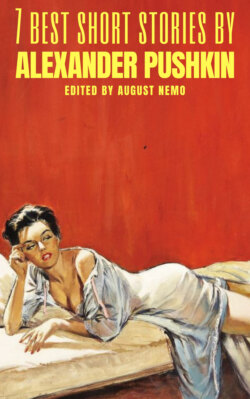Читать книгу 7 best short stories by Alexander Pushkin - Golden Deer Classics, Alexander Pushkin - Страница 3
На сайте Литреса книга снята с продажи.
ОглавлениеThe Author
Alexander Pushkin published his first poem at the age of fifteen and was widely recognized in literary circles even before his graduation at Imperial Lyceum, located in the Tsarskoye Selo, the then royal village. Considered the greatest of Russian poets and the founder of modern Russian literature, he pioneered the use of colloquial language in his poems and plays, creating a narrative style - a mixture of drama, romance and satire - as a poet, using popular expressions and legends , marking his verses with the richness and diversity of the Russian language. It influenced authors like Gogol, Liermontov and Turgeniev forming with them the famous Russian pleiad of authors. To Gogol, for the friendship and mutual project of development of an authentically Russian literature, Pushkin bequeaths some ideas like the one of the theatrical play The inspector general.
Due to his progressive ideas, having been friends with a few Decembrists, responsible for an attempted coup against Tsar Alexander I, he was banished, wandering between 1820 and 1824, through the south of the Russian Empire. Under severe surveillance of state censors and barred from traveling as well as publishing, he writes his most famous play, Boris Godunov, with the obvious influence of William Shakespeare. The piece can only be published years later. He wrote the novel in verse, Eugene Onegin, a panoramic portrait of Russian life, in which he introduced elements that led to the designation of his style as Russian "romanticism" of the nineteenth century. The novel was published in serials from 1825 to 1832, and was the basis of Tchaikovsky's homonymous opera.
In 1826, the writer received the czar's pardon, returning to Moscow. Two years later, Poltav wrote, an epic that tells the love story of Cossack Mazeppa. Growing increasingly prose, he achieved great success with works such as Belkin's Tales, The Lady of Spades and The Captain's Daughter.
Because of his liberal political ideals and his influence on generations of Russian rebels, Pushkin was portrayed by the Bolsheviks as an opponent of bourgeois literature and culture and a forerunner of Soviet literature and poetry.
